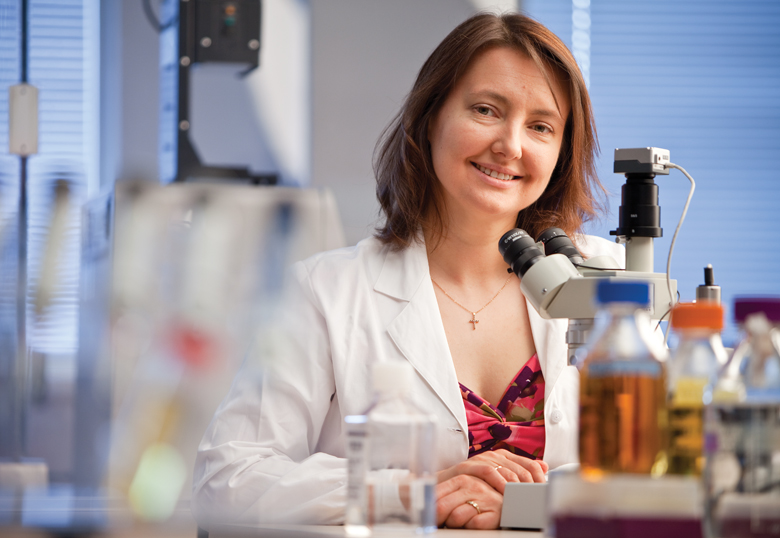You needn’t look too hard to find the motivation for Dr. Olga Kovalchuk’s research focus.
Growing up in Ukraine, Kovalchuk lived just 600 kilometres from Chernobyl, the site of the worst nuclear accident in history. A high school student at the time, with an eye on the medical field, she was greatly influenced by the events at Chernobyl and the response of the medical community and industry as they sought to help with the radioactive fallout and subsequent disease.

It eventually led Kovalchuk into the study of genetics and most recently epigenetics, a burgeoning field that is rapidly gaining attention as it helps scientists understand how diseases of all kinds occur. One of her research interests is on the epigenetics of cancer cells.
On Thursday night, Kovalchuk presented, Epigenetics of Health and Disease – From Personalized Science to Personalized Medicine, to a packed room at Lethbridge City Hall. The presentation was the second of this year’s PUBlic Professor Series, a set of thought-provoking pub-style talks that bring a range of experts and researchers from across the arts and sciences to the community for spirited conversation.
Still considered a re-emerging science, epigenetics is the study of how genes are expressed, or turned on, by environmental factors.
“People say that if genetics is the alphabet of life, epigenetics is the grammar,” explains Kovalchuk, a Canadian Institutes of Health Research (CIHR) Chair of Gender, Work and Health.
In her presentation, Kovalchuk describes how DNA sequences do not determine everything in the body. While the DNA content of each cell in a given higher organism is identical, meaning our liver and brain cells contain the same DNA, they are very different in their shapes and functions.
“This is due to the existence of different patterns in reading and translation of genes for the type of cells in question – referred to as gene expression,” she says.
Epigenetic changes extend beyond cell division to reproduction and although epigenetic changes are inheritable, they are also reversible and play key roles in our responses to the environment, disease predisposition and even to medical treatment.
“There is still a lot to be learned about the role of epigenetic changes in living cells and organisms and their interactions with the environment,” Kovalchuk explained to the audience, noting the role of epigenetic changes in health and disease, and specifically cancer and aging. “Our epigenetic makeup is heavily influenced by environment and lifestyle. Epigenetic changes are pliable and reversible, and therefore I call epigenetics the science of hope. Through positive changes in our lifestyle, we can positively affect the function of our genes."
She went on to describe how medical treatments in the future must recognize the uniqueness of every patient, right down to the cellular level.
“Just as no two people are similar, no two cancers are alike, and there is a lot of variation even within the same tumor,” she said. “Ideal therapeutic regiments targeting every cancer cell in the body must be tailored individually for each patient. We are now working hard with our academic, clinical and industrial partners to establish a public-private alliance with the goal of development and implementation of novel personalized science and medicine strategies."
There is no denying the passion that Kovalchuk has for her studies, which has seen her delve into a variety of areas related to radiation exposure and cancer. In 2013, she began a five-year study into whether men and women were affected differently by radiation exposure in nuclear work environments.
Previously, she was also funded by CIHR to study how radiation induces secondary tumors in cancer patients and what can be done to protect the children of radiation-exposed parents from contracting cancer.
It’s a lifelong pursuit that does not see her slowing down any time soon.
The next talk in the PUBlic Professor series is Thursday, November 19, 2015 when Dr. Craig Coburn presents Understanding the Complexities of Imaging the Earth: The Challenge of Image Calibration.
The entire lineup of PUBlic Professor series presentations can be found at: ulethbridge.ca/artsci/publicprofessor.

